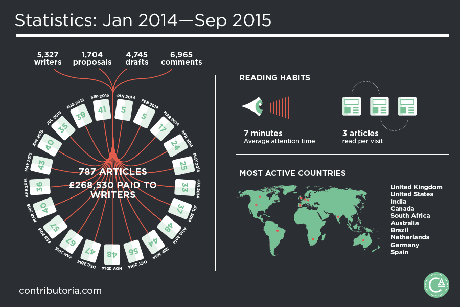
Collaborative, crowdfunded journalism platform Contributoria published its last issue yesterday.
The closure was announced on Friday, and the team explained the Guardian-backed site will become an archive next month to preserve writers' work.
"Although people-supported journalism is something we're all committed to, the team decided it was the right time to look at that challenge in new ways," co-founder Matt McAlister told Journalism.co.uk in an email.
The team is planning to expand on the experience of building and managing the Contributoria community to develop new models.
And while it's too early to start planning the next steps, McAlister, the Guardian's general manager of new digital businesses, said the door at the media organisation is open for similar projects in the future.
Contributoria's prototype won an International Press Institute's News Innovation Contest in 2013 and launched publicly in January 2014.
Since its launch, Contributoria published 787 articles and its writers earned over £260,000.
The platform operated with a three-month production cycle – journalists could pitch stories for funding in the first month, and if their idea got funded they could work together with the community to write and edit the piece, seeing the story published in the third month.
Members of Contributoria each received monthly credits to pledge to their favourite pitches.
Since March, it has also allowed users to suggest story ideas they'd like to see written by journalists using the platform.
Its last issue, A green economy manifesto, was guest edited by designer and campaigner Vivienne Westwood, who also proposed topic ideas for Contributoria's writers to explore.
McAlister said the current issue felt like the right time to close the platform – "might as well go out with a bang".

Image by Contributoria.
Despite the closure, the team remains optimistic about crowdfunded journalism. "Crowdfunding is just one piece of the puzzle," said McAlister, "but we've seen first-hand the voracious appetite people have to be part of the journalism process, including the way it gets financed."
Around the world, media outlets have been turning to crowdfunding and membership models to finance their launch and develop sustainable revenue streams.
Some, like De Correspondent, included a certain degree of editorial involvement in the mix.
And a crowdfunding platform called Byline, launched in July, is also experimenting with different ways of financing stories or regular columns and how contributors would like to be rewarded.
But making the Contributoria model work hasn't been without its challenges, which McAlister said "in hindsight now seem endemic to crowdfunding and open communities".
One problem was the amount of work each writer needed to put into promoting their crowdfunding campaign.
"We really struggled to help independent journalists with smaller followings and unproven ideas who priced their articles too high," he said.
And building a collaborative, open community brought with it the task of moderating comments and dealing with challenging users, as well as ensuring the final pieces were of high standards.
"Maintaining a high quality threshold for journalism is more art than science," said McAlister. "We feel like we got it right most of the time, but it wasn’t always easy."
Free daily newsletter
If you like our news and feature articles, you can sign up to receive our free daily (Mon-Fri) email newsletter (mobile friendly).
Related articles
- Black Ballad hits a decade: 'Our priority will always be our community'
- Workflow tips in participatory journalism, with Annie Slemrod and Nuha Al-Junaid
- New investigative project helps resource-poor newsrooms report on health
- New Scottish collaborative publication launched to "lessen the load" on independent titles
- Newly launched news co-operative wants to boost local journalism in Leicester









